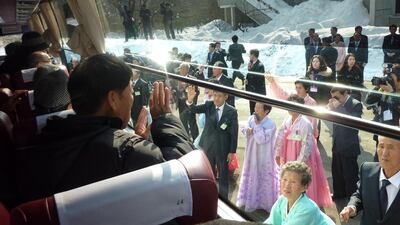SEOUL // North and South Korea have agreed to hold a reunion for families separated by the Korean War – the fruit of a deal struck last month after cross-border tensions came close to boiling over into outright conflict.
The reunion ia only the second to be held in five years, and will take place between October 20-26 in North Korea’s Mount Kumgang resort with 100 participants from each side, the South’s unification ministry said.
The two Koreas had committed themselves to organising the event two weeks ago in an accord that ended a dangerous military standoff and pulled both sides back from the brink of an armed conflict.
The fact that they have followed through by agreeing a date and venue will be seen as a further positive sign, although the North has agreed to reunions in the past only to cancel at the last minute.
Seoul was understood to have been pushing for an earlier date – before North Korea celebrates the 70th anniversary of the founding of its ruling Worker’s Party on October 10.
Pyongyang is planning a massive military parade and there has been speculation it might also launch a long-range rocket – a move that would trigger fresh UN sanctions and threaten the holding of the reunion.
The final dates were agreed at all-night talks between North and South Korean Red Cross officials in the border truce village of Panmunjom.
The chief South Korean delegate, Lee Duk-haeng, confirmed that his side had requested a reunion at the “earliest possible date”, but the North side demurred, citing preparations for the October 10 celebrations.
Millions of people were separated during the 1950-53 Korean conflict that sealed the division between the two Koreas.
Most died without having a chance to see or hear from their families on the other side of the border, across which all civilian communication is banned.
About 66,000 South Koreans, many of them in their 80s or 90s, are on the waiting list for an eventual reunion, but only a very limited number can be chosen each time.
The reunion programme began in earnest after a historic North-South summit in 2000, and was initially an annual event.
But strained cross-border relations have allowed only one reunion in the past five years.
Shim Goo-seob, president of an association representing separated families in South Korea said he was disappointed that each side had again been limited to just 100 participants.
“If it carries on like this, what chance do the 60,000 others on the waiting list have of getting their turn?” he said.* Agence France-Presse

